Oh yeah, Ian moved out…
Dan Swearingen | July 10, 2016
 Ian always planned on moving out when he was 20. To Sausalito. To a houseboat. Or maybe a mobile home. Ian is always thinking about plans for the next step.
Ian always planned on moving out when he was 20. To Sausalito. To a houseboat. Or maybe a mobile home. Ian is always thinking about plans for the next step.
The summer of 2014, after Ian left high school he started reminding us it was time for him to move out. Janet and I were both “yeah, yeah, yeah, we’ll get the paperwork started.” Ian was 19.
We have worked with other families to help their children move out of the family home into some sort of more independent living situation. It can take years to find the right situation. Here in Marin County we usually work with Lifehouse Agency. For living outside the home in California there are basically three places the funding comes from: state and federal funds from Social Security Insurance funds, the Regional Center (in our case the Golden Gate Regional Center), and support from the family.
The previous summer we had thrashed out Ian’s SSI situation. Ian is a medium verbal autistic and is considered 100% disabled. Other than a pile of paperwork and some office visits, our Social Security Administration experience went well. Your mileage may vary… Anyway SSI: DONE.
Ian had been a regional center client since he was 3 years old and we had kept his status up to date. This mainly entailed a home visit each year by his case worker(s). We never received any financial assistance from GGRC when Ian was a minor but Regional Center support is crucial once your child is an adult. Anyway, the annual meetings kept his account open. Regional Center client status: DONE.
The first step for supported housing is to contact the regional center. Janet made an appointment to get the process started. She also contacted Lifehouse Agency to get Ian onto their list. A year or so earlier, Lifehouse had opened a new residence less than a mile from our home that was specifically for young adult autistics and we hoped, one day, he might be able to move in.
 With all the phone calls made and paperwork submitted we settled in for the long wait. Given our experience with others and the stories we had heard, we fully expected to wait for a year or more before a residence opened up. On the waiting list at Lifehouse: DONE.
With all the phone calls made and paperwork submitted we settled in for the long wait. Given our experience with others and the stories we had heard, we fully expected to wait for a year or more before a residence opened up. On the waiting list at Lifehouse: DONE.
Less than two weeks after contacting Lifehouse a bedroom came available at the Corte Madera House with three other autistic men. It’s in a nice neighborhood, two blocks from stores with nearby bus stops. The house has a staff person on hand to help guide housekeeping and shopping and stays overnight. Only two miles away from our house, all downhill. We can be there in minutes. No excuses, it was a perfect first placement.
We had gone through the motions to appease Ian’s growing desire for independence but Janet and I were not really ready for this.
We thought perhaps the GGRC approval would slow the process down. But they thought the placement was excellent and fast-tracked the paperwork. So, two weeks after deciding to look for an acceptable new home for Ian, we were packing his bags.

Ian was enthusiastic about every step. We wanted to keep his bedroom at our house intact as a safety net. We raided Ikea for his bedroom furniture: bed, desk, chair, and dresser. He took his clothes, PC, TV set, books, and a few movies. We put together a basic set of pots and pans. Dishes and such are shared at the house.
For Janet and me, all of this was another of those “this is what we should be doing ((but I don’t know if it will work) and I’d really rather things just stay the same)” moments. We had a swirling kaleidoscope of emotions and a long list of worries. And fears. And nightmares.
Will he starve? Will he eat nothing but junk?
Will he forget to shave? Brush his teeth?
Will he hate his roommates? Will they hate him?
Will he die in his sleep? (I did not claim these were rational fears…)
Will he remember to wear clean clothes?
Will he get enough sleep?
Will he be lonely? Depressed?
Will he overdraw his bank account?
Will he get scammed by somebody?
Imagining failure modes is one of my superpowers. I can probably brainstorm another hundred worries.
Moving Ian into the house was extremely hard for Janet and me. So hard and so upsetting that this is why it has taken nearly two years to write about it and share the experience. Meeting Ian’s roommates and moving him in was one of those times it was really forced into our face: our son is disabled and his adult life will be very different from other kids his age. In our bubble at home we could fool ourselves that all was normal and we could imagine the future. Reality hurt. Still hurts.
Four autistic adult men share a house. What do you think it looks like? Depressing. Silent. Ian’s roommates are all at least ten years older.
 For us, moving Ian still hurts and worries us – it still needs our courage to continue. But we are also positive that it was the right thing to do and that it has been good for him.
For us, moving Ian still hurts and worries us – it still needs our courage to continue. But we are also positive that it was the right thing to do and that it has been good for him.
For Ian, moving out has been amazing. His confidence has grown. His functional independence has grown. He refuses to ever spend the night back home and has relented only when he was recovering from getting his wisdom teeth pulled, down with a cold, or during the holidays when his house is empty and the staff are away. We are planning more major dental work so we can see him more. Ian calls us every night before he goes to bed and he’s used Face Time to do things like have us help him find the right settings on the washing machine.
 We see Ian nearly every day at Autistry. Ian continues to attend College of Marin and as the second anniversary in his first house comes up he is starting to think about what the next house will be.
We see Ian nearly every day at Autistry. Ian continues to attend College of Marin and as the second anniversary in his first house comes up he is starting to think about what the next house will be.
He keeps reminding us that “Animal House” is still what he thinks is ideal housing while attending college.



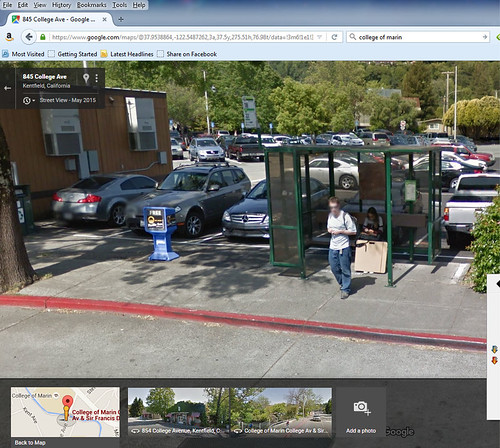
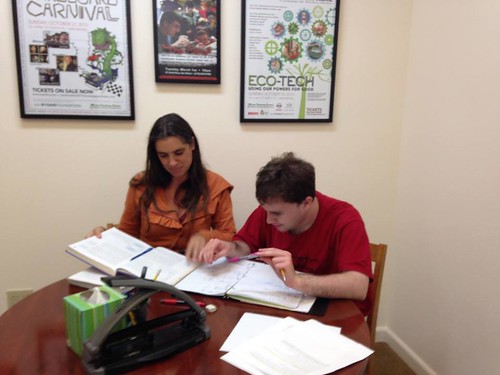
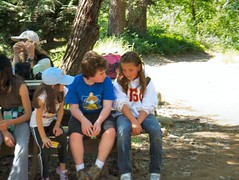


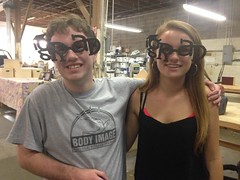
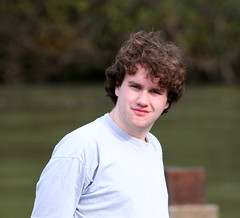 Ian is bravely trying out a college class at College of Marin. While it is not a community college in San Francisco complete with dorms, (one of Ian’s current dreams), it is a huge step towards the independent adult life that he is trying to build for himself and that his parents are working to support with all of their hearts. In true Dan and Janet fashion, when they looked at the current programs to support students with disabilities at the local community college and found them lacking, they set out to build something better.
Ian is bravely trying out a college class at College of Marin. While it is not a community college in San Francisco complete with dorms, (one of Ian’s current dreams), it is a huge step towards the independent adult life that he is trying to build for himself and that his parents are working to support with all of their hearts. In true Dan and Janet fashion, when they looked at the current programs to support students with disabilities at the local community college and found them lacking, they set out to build something better.  Thus I am attending the class with Ian, not only to support him as a student, but to investigate the nature of supporting ASD (Autism Spectrum Disorder) individuals at the college level. In addition to thinking about balancing Ian’s needs with those of his teacher and classmates, I am going to be doing my best to think about how this support could be scaled up to meet the needs of other ASD students.
Thus I am attending the class with Ian, not only to support him as a student, but to investigate the nature of supporting ASD (Autism Spectrum Disorder) individuals at the college level. In addition to thinking about balancing Ian’s needs with those of his teacher and classmates, I am going to be doing my best to think about how this support could be scaled up to meet the needs of other ASD students.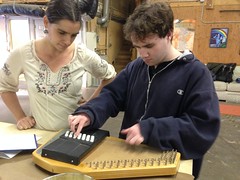 One of the joys and challenges of working with ASD individuals is the incredible diversity of their skills, talents and needs. During our first day of class, I noticed that Ian’s tendency is to tune out the intense verbal language of the lecture component of the class. While doing this, he is still working hard to stay regulated and to present an outward impression of paying attention. He is quiet and still at his desk and looks toward the teacher as she talks. Asking him questions, prompting him to write down essential concepts and reminding him to pay attention were strategies I tried to increase his level of attendance to the material being presented. I am helped in these efforts by the nature of the class, a drama class which teaches fundamental acting skills. As such, the class is taught by a woman who has a background in acting and who conducts her class in an engaging manor. High levels of affect naturally interest Ian, and prompt him to attend to the material. Another helpful element of the class is that the students tend to only spend small chunks of time on lecture material before being called to their feet and asked to put principles into active practice.
One of the joys and challenges of working with ASD individuals is the incredible diversity of their skills, talents and needs. During our first day of class, I noticed that Ian’s tendency is to tune out the intense verbal language of the lecture component of the class. While doing this, he is still working hard to stay regulated and to present an outward impression of paying attention. He is quiet and still at his desk and looks toward the teacher as she talks. Asking him questions, prompting him to write down essential concepts and reminding him to pay attention were strategies I tried to increase his level of attendance to the material being presented. I am helped in these efforts by the nature of the class, a drama class which teaches fundamental acting skills. As such, the class is taught by a woman who has a background in acting and who conducts her class in an engaging manor. High levels of affect naturally interest Ian, and prompt him to attend to the material. Another helpful element of the class is that the students tend to only spend small chunks of time on lecture material before being called to their feet and asked to put principles into active practice. During the circle exercises of the first day, passing names and gestures around a circle, first methodically and then in a random pattern, Ian displayed a very high level of engagement. He not only “got” the games, he was good at them. Over the course of these exercises, I saw the students’ perception of Ian change. Their attitude shifted from one of curiosity to one of interest, and he was chosen often by his peers to participate. He was good at remembering the names of his peers and who had or had not been already chosen. It was gratifying to see Ian engaging and succeeding. Our only interaction during this period was when he would catch my eye from across the room and I would give him a smile or thumbs-up. This first day showed me three different levels of engagement and motivation that Ian currently possesses. There was a language-based lecture that he needed a high level of support to gain benefit from, a short film sequence and some short monologue performances that Ian watched intently and was able to comment on with very little scaffolding/prompting, and there were the active exercises, which he was able to attend to and participate in without support.
During the circle exercises of the first day, passing names and gestures around a circle, first methodically and then in a random pattern, Ian displayed a very high level of engagement. He not only “got” the games, he was good at them. Over the course of these exercises, I saw the students’ perception of Ian change. Their attitude shifted from one of curiosity to one of interest, and he was chosen often by his peers to participate. He was good at remembering the names of his peers and who had or had not been already chosen. It was gratifying to see Ian engaging and succeeding. Our only interaction during this period was when he would catch my eye from across the room and I would give him a smile or thumbs-up. This first day showed me three different levels of engagement and motivation that Ian currently possesses. There was a language-based lecture that he needed a high level of support to gain benefit from, a short film sequence and some short monologue performances that Ian watched intently and was able to comment on with very little scaffolding/prompting, and there were the active exercises, which he was able to attend to and participate in without support. The drama exercises can be viewed as intense focused social interactions that follow distinct sets of rules. With these rules in place, Ian was able to have prolonged interactions with his peers, both one-on-one and as a group. This component of the class is important, challenging, and highly motivating for Ian. He is a member of an ensemble. He is having to stretch himself to fulfill his obligation to the ensemble, and some of his peers may be having to stretch their perception of disability in order to fulfill their obligations to him. I find this to be incredibly healthy stretching for all parties.
The drama exercises can be viewed as intense focused social interactions that follow distinct sets of rules. With these rules in place, Ian was able to have prolonged interactions with his peers, both one-on-one and as a group. This component of the class is important, challenging, and highly motivating for Ian. He is a member of an ensemble. He is having to stretch himself to fulfill his obligation to the ensemble, and some of his peers may be having to stretch their perception of disability in order to fulfill their obligations to him. I find this to be incredibly healthy stretching for all parties. So I have not written in this blog for some time and I apologize. My intent was to do this more regularly but perhaps monthly is a better goal.
So I have not written in this blog for some time and I apologize. My intent was to do this more regularly but perhaps monthly is a better goal.  Connor has been attending a county program since finishing up high school. This is a program that stresses very little academics and has a lot of down time. We decided to have Connor attend as he needed a place where he would be engaged and around others his age. There was also a very structured transportation element that would facilitate independence in taking the bus. We had only hoped to have Connor attend for a year as we worked to figure out other post high school options. He is now in his second year and really thriving. What has happened is Connor has taken complete ownership for this program. He knows on what days he needs to bring lunch and makes his own without any involvement from us. On the days he goes to Safeway he checks with his dad about what he should purchase. Connor will also buy things that he needs like mouthwash or toothpaste. He monitors this on his own. He gets ready in the morning on his own and is always ready when the taxi arrives. We in fact do not need to be home. He is also taking the bus on his own. He is given money at the beginning of the week and has to budget for the week to cover lunches, bus fare and trips to Safeway. I share this as sometimes as parents we walk away from some programs without considering the long term impact. I have actually never visited this class when in session as I knew I would be looking for something else. Connor is almost 21 and he needs to make his own choices and also be responsible for his activities. We have really stepped back and we are the ones who are also transitioning.
Connor has been attending a county program since finishing up high school. This is a program that stresses very little academics and has a lot of down time. We decided to have Connor attend as he needed a place where he would be engaged and around others his age. There was also a very structured transportation element that would facilitate independence in taking the bus. We had only hoped to have Connor attend for a year as we worked to figure out other post high school options. He is now in his second year and really thriving. What has happened is Connor has taken complete ownership for this program. He knows on what days he needs to bring lunch and makes his own without any involvement from us. On the days he goes to Safeway he checks with his dad about what he should purchase. Connor will also buy things that he needs like mouthwash or toothpaste. He monitors this on his own. He gets ready in the morning on his own and is always ready when the taxi arrives. We in fact do not need to be home. He is also taking the bus on his own. He is given money at the beginning of the week and has to budget for the week to cover lunches, bus fare and trips to Safeway. I share this as sometimes as parents we walk away from some programs without considering the long term impact. I have actually never visited this class when in session as I knew I would be looking for something else. Connor is almost 21 and he needs to make his own choices and also be responsible for his activities. We have really stepped back and we are the ones who are also transitioning.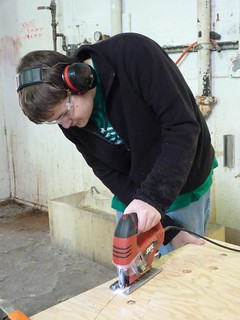 Connor has 3 different part time jobs/internships including the Autistry Model Employment Program. He works hard at these jobs and we are hopeful that this will be a foundation for future employment as he has acquired great skills and understands better the work environment. We await word from the Department of Rehabilitation as we hope to transfer Connor to paying jobs. I will blog about that journey. We still have not accessed GGRC but will be soon.
Connor has 3 different part time jobs/internships including the Autistry Model Employment Program. He works hard at these jobs and we are hopeful that this will be a foundation for future employment as he has acquired great skills and understands better the work environment. We await word from the Department of Rehabilitation as we hope to transfer Connor to paying jobs. I will blog about that journey. We still have not accessed GGRC but will be soon.

 As we try to spread awareness and acceptance I find that it is much harder to garner support for adults. I do not really understand but seems that perhaps people believe when supporting younger kids there is hope for further growth and success but when reach adulthood then support just means some form of hand out or charity. So our mission becomes to educate the community that our young adolescents have much to contribute and that support for them also means further growth and success.
As we try to spread awareness and acceptance I find that it is much harder to garner support for adults. I do not really understand but seems that perhaps people believe when supporting younger kids there is hope for further growth and success but when reach adulthood then support just means some form of hand out or charity. So our mission becomes to educate the community that our young adolescents have much to contribute and that support for them also means further growth and success. I am not sure this message is really getting out there. Folks are listening but no one is engaging. We need to reach outside our safe community and engage others who truly would benefit from hiring our adolescents. I need everyone reading this to think of people that own a company or have the ability to hire on some of these adults. There are agencies out there that will partner with these employers. I am challenging you to think of one person or one company where you have a contact. You and others will feel so empowered to have helped. I have helped two agencies make contact with 2 law firms who have successfully placed two adults and I cannot express how much value these very special adults are bringing to these employers.
I am not sure this message is really getting out there. Folks are listening but no one is engaging. We need to reach outside our safe community and engage others who truly would benefit from hiring our adolescents. I need everyone reading this to think of people that own a company or have the ability to hire on some of these adults. There are agencies out there that will partner with these employers. I am challenging you to think of one person or one company where you have a contact. You and others will feel so empowered to have helped. I have helped two agencies make contact with 2 law firms who have successfully placed two adults and I cannot express how much value these very special adults are bringing to these employers.


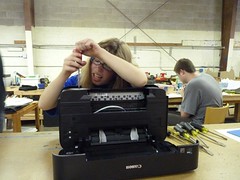 Several people have recently contacted me to talk about the lack of job training skills that our adolescents may be receiving as right now their full time job may just be to attend school. Also, not many schools integrate internships into the curriculum or as part of the IEP. Truthfully though this should really be part of any transition IEP. We need to create opportunities for our adolescents and we should find a way to get the schools to incorporate this into any IEP. You, however, must take initiative to discover these opportunities. An internship may be more appropriate than homework. A parent recently shared with me that the homework she has for her daughter is specific to life skills. This will ensure that there is continuity with these skills at home and provide better generalization. These skills may be cooking a meal or preparing lunch. If you have an adolescent who is strong academically but lacks basic hygiene or other skills that will allow them to be independent and also keep a job then you may want to consider how to balance this.
Several people have recently contacted me to talk about the lack of job training skills that our adolescents may be receiving as right now their full time job may just be to attend school. Also, not many schools integrate internships into the curriculum or as part of the IEP. Truthfully though this should really be part of any transition IEP. We need to create opportunities for our adolescents and we should find a way to get the schools to incorporate this into any IEP. You, however, must take initiative to discover these opportunities. An internship may be more appropriate than homework. A parent recently shared with me that the homework she has for her daughter is specific to life skills. This will ensure that there is continuity with these skills at home and provide better generalization. These skills may be cooking a meal or preparing lunch. If you have an adolescent who is strong academically but lacks basic hygiene or other skills that will allow them to be independent and also keep a job then you may want to consider how to balance this. Consider transportation needs if your adolescent will not drive. Our son took the bus on his own last week and walked to his job. We had to be very strategic as for the past year as he has been very resistant to doing this on his own. He practiced many times and we are having someone shadow him. He had to be the one to tell us he was ready which I believe to all be part of his own growth. As I often share with others we just cannot get caught up with the time it may take to gain a particular skill as many of our adolescents can take a long time to get there but when they get there they generally retain what they learned. We also worry about how others will react to him in public when he starts talking to himself or pacing or even just looking up all the time. He is very comfortable sharing with others that he has autism and we have talked to him about what he would do if someone reacted to his behavior. He has some responses but most importantly he has a cell phone so he can call us or anyone else that he knows can help him. Some day he will be on his own and we have to face these issues now so he knows how to manage them. Very overwhelming as a parent. I am most motivated by the fact that I want his younger brother to have his own life and choices as he will likely be C guardian some day when we are no longer here. If C is able to live independently and work with support of GGRC this will not fall on my younger son.
Consider transportation needs if your adolescent will not drive. Our son took the bus on his own last week and walked to his job. We had to be very strategic as for the past year as he has been very resistant to doing this on his own. He practiced many times and we are having someone shadow him. He had to be the one to tell us he was ready which I believe to all be part of his own growth. As I often share with others we just cannot get caught up with the time it may take to gain a particular skill as many of our adolescents can take a long time to get there but when they get there they generally retain what they learned. We also worry about how others will react to him in public when he starts talking to himself or pacing or even just looking up all the time. He is very comfortable sharing with others that he has autism and we have talked to him about what he would do if someone reacted to his behavior. He has some responses but most importantly he has a cell phone so he can call us or anyone else that he knows can help him. Some day he will be on his own and we have to face these issues now so he knows how to manage them. Very overwhelming as a parent. I am most motivated by the fact that I want his younger brother to have his own life and choices as he will likely be C guardian some day when we are no longer here. If C is able to live independently and work with support of GGRC this will not fall on my younger son.


